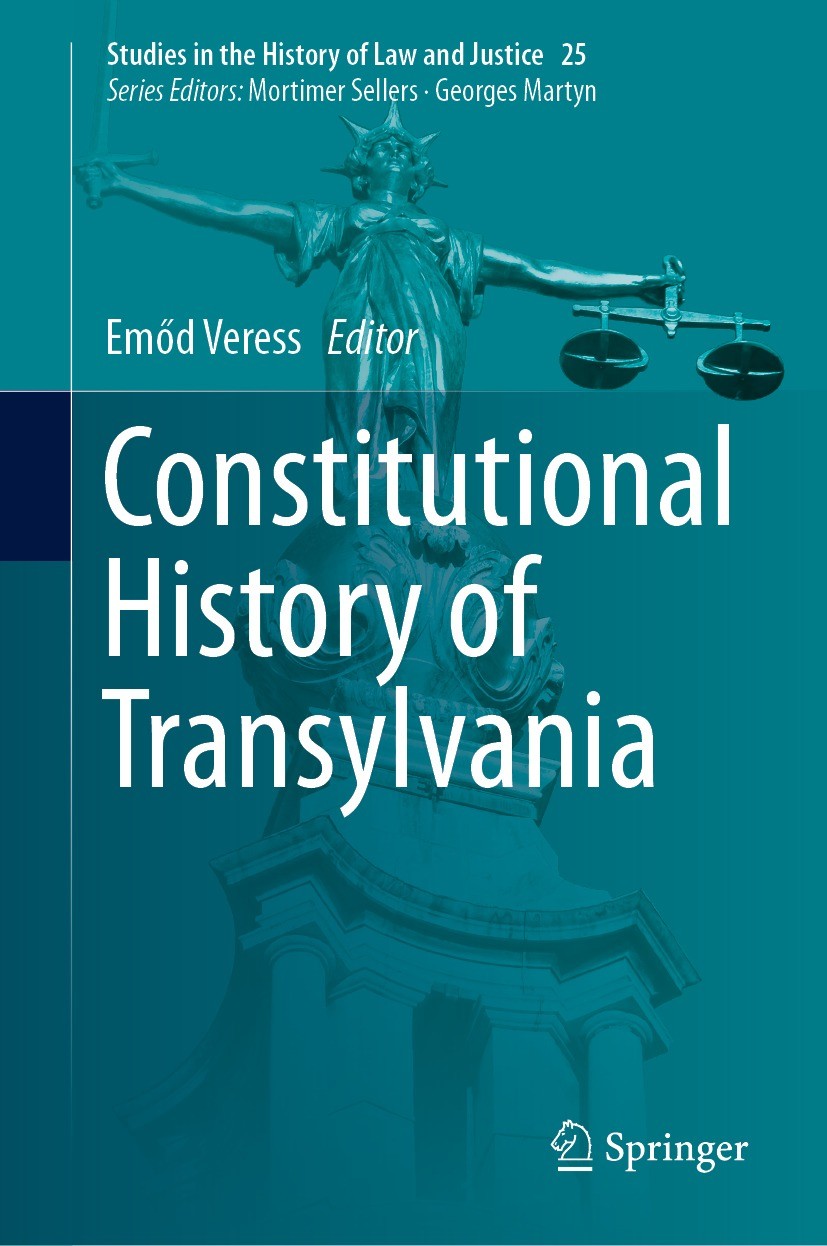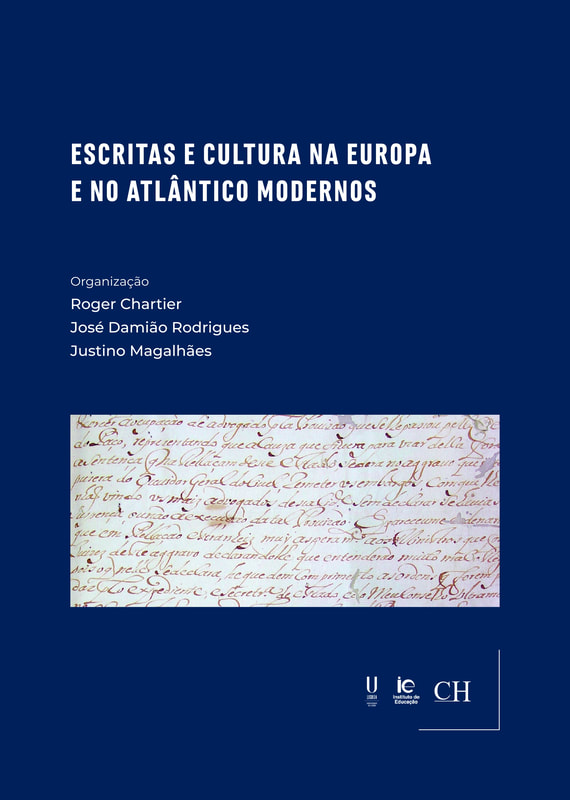
Neste guia, pode consultar as doações efetuadas à Biblioteca, ordenadas por área temática.
Clique no título para aceder ao registo bibliográfico no catálogo e em  para conhecer o conteúdo das obras
para conhecer o conteúdo das obras
 Constitucional history of Transylvania
de
ed. Emőd Veress
This book examines the constitutional history of Transylvania, a region of Central Europe that has experienced a compelling series of historical events and been governed by a variety of ancient, medieval, and modern entities, as well as its own peoples, who from time to time have jointly or separately exercised their right to self-governance. The book’s main goal is to provide, for the first time in English, a comprehensive source for those interested in the variety of states, constitutional and public legal orders which have succeeded one another during Transylvania’s tumultuous history. It serves to underline the region’s uniqueness as a space where (for better or worse) several nationalities, multiple religions and varied cultures have had to find a way to get along, under the pressures of external state and constitutional orders. It seeks to show both the positive and the negative solutions found, which advanced or hindered this goal of organised coexistence
Constitucional history of Transylvania
de
ed. Emőd Veress
This book examines the constitutional history of Transylvania, a region of Central Europe that has experienced a compelling series of historical events and been governed by a variety of ancient, medieval, and modern entities, as well as its own peoples, who from time to time have jointly or separately exercised their right to self-governance. The book’s main goal is to provide, for the first time in English, a comprehensive source for those interested in the variety of states, constitutional and public legal orders which have succeeded one another during Transylvania’s tumultuous history. It serves to underline the region’s uniqueness as a space where (for better or worse) several nationalities, multiple religions and varied cultures have had to find a way to get along, under the pressures of external state and constitutional orders. It seeks to show both the positive and the negative solutions found, which advanced or hindered this goal of organised coexistence
 Estudos de direito eleitoral e político
de
coord. Renato Hayashi, Pietro Duarte, Orlando Morais Neto
Estudos de direito eleitoral e político
de
coord. Renato Hayashi, Pietro Duarte, Orlando Morais Neto
 Sob escuta : reflexões sobre o problema das escutas telefónicas e as funções do Juiz de Instrução Criminal
de
Maria de Fátima Mata-Mouros
«Abrir a porta do meu gabinete de juiz de instrução criminal ao público em geral é o objectivo essencial deste livro. Daí a sugestiva escolha do título - Sob Escuta. Ele reflecte não apenas o tema da matéria essencialmente abordada, mas também o modo de tratamento adoptado: o testemunho. E, de entre os testemunhos possíveis, aquele que me parece constituir o mais genuíno: o prestado sem consciência da sua audição por terceiros. Neste caso, terceiros serão apenas aqueles que, tendo embora a possibilidade de o fazer, não quiserem ouvir a verdade que integra o dia-a-dia de um juiz de instrução criminal no Portugal dos nossos dias. Espero que o leitor comum possa encontrar as informações necessárias para compreender o que são, como se fazem e o que significam as escutas telefónicas, bem como o papel do juiz de instrução criminal na sua realização. Mais genericamente, procurei oferecer uma perspectiva da intervenção reservada ao juiz de instrução criminal no inquérito, em especial na aplicação da prisão preventiva, que configura seguramente um dos aspectos mais delicados das competências reservadas ao juiz de instrução criminal no nosso sistema e tanta controvérsia tem suscitado nos últimos tempos»
Sob escuta : reflexões sobre o problema das escutas telefónicas e as funções do Juiz de Instrução Criminal
de
Maria de Fátima Mata-Mouros
«Abrir a porta do meu gabinete de juiz de instrução criminal ao público em geral é o objectivo essencial deste livro. Daí a sugestiva escolha do título - Sob Escuta. Ele reflecte não apenas o tema da matéria essencialmente abordada, mas também o modo de tratamento adoptado: o testemunho. E, de entre os testemunhos possíveis, aquele que me parece constituir o mais genuíno: o prestado sem consciência da sua audição por terceiros. Neste caso, terceiros serão apenas aqueles que, tendo embora a possibilidade de o fazer, não quiserem ouvir a verdade que integra o dia-a-dia de um juiz de instrução criminal no Portugal dos nossos dias. Espero que o leitor comum possa encontrar as informações necessárias para compreender o que são, como se fazem e o que significam as escutas telefónicas, bem como o papel do juiz de instrução criminal na sua realização. Mais genericamente, procurei oferecer uma perspectiva da intervenção reservada ao juiz de instrução criminal no inquérito, em especial na aplicação da prisão preventiva, que configura seguramente um dos aspectos mais delicados das competências reservadas ao juiz de instrução criminal no nosso sistema e tanta controvérsia tem suscitado nos últimos tempos»
 Juiz das liberdades : desconstrução de um mito do processo penal
de
Maria de Fátima Mata-Mouros
"Este livro corresponde, com pontuais alterações e actualização de referências legislativas, jurisprudenciais e doutrinárias, à dissertação de doutoramento que, em 27 de Novembro de 2009, e sob o título «A Reserva de Juiz nas Medidas de Investigação Restritivas de Direitos Fundamentais no Inquérito Criminal», foi apresentada à Faculdade de Direito da Universidade Católica Portuguesa e examinada em provas públicas, em 31 de Janeiro de 2011, perante um Júri presidido pelo Magnífico Reitor Doutor Manuel Braga da Cruz e integrado pêlos Professores Doutores Jorge Miranda, Damião da Cunha, Mário Monte, Germano Marques da Silva (orientador da tese), Maria João Antunes (arguente), Maria Paula Ribeiro de Faria (arguente) e Paulo Pinto de Albuquerque, que atribuiu à autora o grau académico de Doutor em Direito, com a classificação de 18 valores. Agradeço a quem tornou possível esta obra, em especial: À Universidade Católica, na pessoa do Professor Doutor Germano Marques da Silva, orientador da tese, pela generosa confiança depositada na capacidade para a empreender. Ao Conselho Superior da Magistratura, pela licença sabática concedida. A todos os autores citados ao longo do texto, pêlos estudos e reflexões que o precederam. E ao meu marido, Professor António Pedro Barbas Homem, pelo incansável acompanhamento e aconselhamento"
Juiz das liberdades : desconstrução de um mito do processo penal
de
Maria de Fátima Mata-Mouros
"Este livro corresponde, com pontuais alterações e actualização de referências legislativas, jurisprudenciais e doutrinárias, à dissertação de doutoramento que, em 27 de Novembro de 2009, e sob o título «A Reserva de Juiz nas Medidas de Investigação Restritivas de Direitos Fundamentais no Inquérito Criminal», foi apresentada à Faculdade de Direito da Universidade Católica Portuguesa e examinada em provas públicas, em 31 de Janeiro de 2011, perante um Júri presidido pelo Magnífico Reitor Doutor Manuel Braga da Cruz e integrado pêlos Professores Doutores Jorge Miranda, Damião da Cunha, Mário Monte, Germano Marques da Silva (orientador da tese), Maria João Antunes (arguente), Maria Paula Ribeiro de Faria (arguente) e Paulo Pinto de Albuquerque, que atribuiu à autora o grau académico de Doutor em Direito, com a classificação de 18 valores. Agradeço a quem tornou possível esta obra, em especial: À Universidade Católica, na pessoa do Professor Doutor Germano Marques da Silva, orientador da tese, pela generosa confiança depositada na capacidade para a empreender. Ao Conselho Superior da Magistratura, pela licença sabática concedida. A todos os autores citados ao longo do texto, pêlos estudos e reflexões que o precederam. E ao meu marido, Professor António Pedro Barbas Homem, pelo incansável acompanhamento e aconselhamento"
 Direito e ciberespaço : coletânea de artigos da revista Digital Cyberlaw by CIJIC
de
coord. Eduardo Vera-Cruz Pinto, Marco Antonio Marques da Silva
Direito e ciberespaço : coletânea de artigos da revista Digital Cyberlaw by CIJIC
de
coord. Eduardo Vera-Cruz Pinto, Marco Antonio Marques da Silva
 Smart law : habitar o mundo digital e conviver com novas tecnologias
de
ed. Agata C. Amato Mangiameli
Entre as novas tecnologias, um papel de destaque e, ao mesmo tempo, um avanço significativo são desempenhados pelos estudos e aplicações da inteligência artificial em quase todos os campos e, em especial, no campo jurídico. O motivo é óbvio e está ligado não apenas à economia de tempo e energia em comparação com atividades rotineiras ou repetitivas, mas também à possibilidade de realizar trabalhos cognitivos muito sofisticados. No entanto, para vivenciar plenamente o mundo digital e conviver harmoniosamente com as novas tecnologias,o seu projeto e desenvolvimento devem seguir sempre linhas antropogênicas e antropocêntricas, de modo a gerar no público um clima de confiança generalizada, regido por princípios e formas de regulamentação smart
Smart law : habitar o mundo digital e conviver com novas tecnologias
de
ed. Agata C. Amato Mangiameli
Entre as novas tecnologias, um papel de destaque e, ao mesmo tempo, um avanço significativo são desempenhados pelos estudos e aplicações da inteligência artificial em quase todos os campos e, em especial, no campo jurídico. O motivo é óbvio e está ligado não apenas à economia de tempo e energia em comparação com atividades rotineiras ou repetitivas, mas também à possibilidade de realizar trabalhos cognitivos muito sofisticados. No entanto, para vivenciar plenamente o mundo digital e conviver harmoniosamente com as novas tecnologias,o seu projeto e desenvolvimento devem seguir sempre linhas antropogênicas e antropocêntricas, de modo a gerar no público um clima de confiança generalizada, regido por princípios e formas de regulamentação smart
 Privacidade e proteção de dados do Município de Lisboa
de
coord. Cristina Caldeira
Privacidade e proteção de dados do Município de Lisboa
de
coord. Cristina Caldeira
 Manuel Joaquim Pinheiro Chagas : 1842-1895- 1895 : uma biografia
de
António Pedro Barbas Homem
Manuel Joaquim Pinheiro Chagas : 1842-1895- 1895 : uma biografia
de
António Pedro Barbas Homem
 Escritas e cultura na Europa e no Atlântico modernos
de
org. Roger Chartier, José Damião Rodrigues, Justino Magalhães
Escritas e cultura na Europa e no Atlântico modernos
de
org. Roger Chartier, José Damião Rodrigues, Justino Magalhães